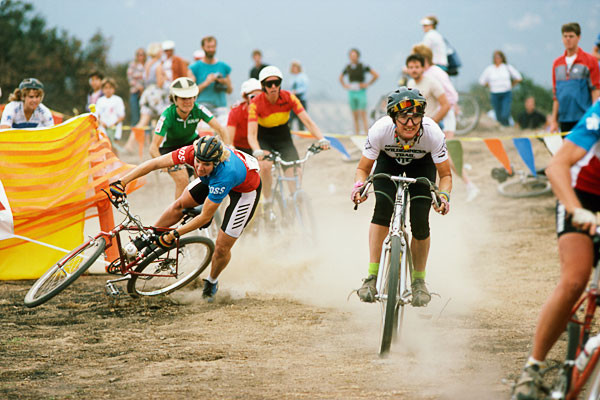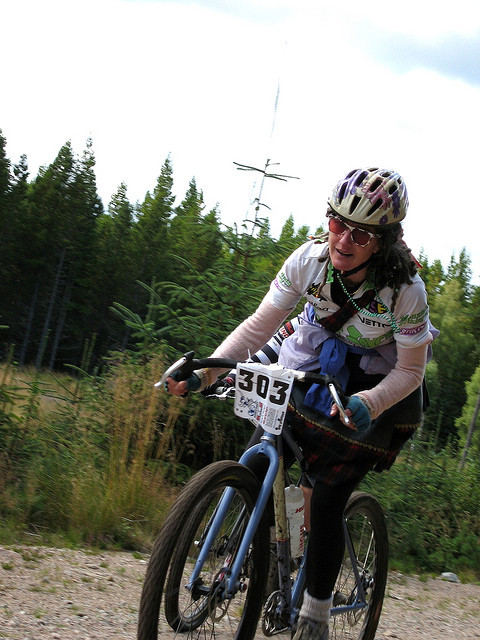Jacquie Phelan stands as a monumental figure in the world of mountain biking, often hailed as the Godmother or Queen of the sport. More than just a title, it reflects her pivotal role as one of the earliest pioneers, fearlessly forging a path for women in a domain that was, in its nascent stages, largely dominated by men. Alongside other luminaries like Jack Ingram and her husband Charlie Cunningham, she co-founded the National Off-Road Bicycle Association (NORBA), a cornerstone in the organized growth of mountain biking. Her competitive spirit shone brightly as she clinched NORBA championships and numerous other mountain bike race victories throughout the 80s and 90s. Beyond racing, Jacquie established the first women’s mountain bike club, WOMBATS, and continues her unwavering dedication to promoting women’s participation in mountain biking today.
In this insightful conversation, Jacquie recounts her initial foray into mountain biking, her experiences navigating the early racing scene as a woman, the genesis of the WOMBATS, and her broader perspectives on the sport’s evolution.
Early Encounters with Mountain Biking
Reflecting on her introduction to the sport, Jacquie shares, “I was actively training on my road bike around 1981. The ban on women in Olympic cycling had just been lifted, and with encouragement from my friend Darryl Skrabak, I decided to pursue racing.” This initial foray into cycling was soon to take an adventurous turn. “Then, Darryl’s friend, Holland Jones, introduced me to Mount Tamalpais one summer day around 1980. We rode from the city on my road bike, taking the RR grade up – a gentle 5-7% incline known as the ‘crookedest railroad in the world’.”
 Jacquie Phelan in an early mountain bike race, showcasing her competitive spirit and skill on a bicycle women's mountain bike.
Jacquie Phelan in an early mountain bike race, showcasing her competitive spirit and skill on a bicycle women's mountain bike.
The experience was transformative. “Riding approximately 20 paved urban miles across the Golden Gate Bridge from our foggy neighborhood and emerging into sunny Mill Valley, then climbing Tam – even with the bumps and well-inflated tires (cyclists were a rarity on RR grade back then) – was incredible.” The descent was equally exhilarating. “We flew down the pavement, Ridgecrest Blvd, and Panoramic. It was so liberating. I immediately knew that these cool multi-surface rides were going to be a significant part of my cycling life.”
Jacquie humorously recalls Holland Jones, “Holland’s a quirky character; he’d smoke cigarettes just to provoke other bikers.” He owned Fulton St. Cyclery, a shop that held a certain allure. “If I had secured a grant at City College (thankfully, I didn’t), I might have spent the $1000 windfall on a custom-made Jack Taylor bike from his shop.”
The Allure of Racing and Navigating a Male-Dominated Sport
When asked about what drew her to racing, Jacquie offers a candid response, “Racing is inherently narcissistic. I am quite vain; I genuinely believed I was ‘the best’ (and faced criticism for expressing that). Perhaps I was a bit ahead of myself in declaring my own greatness, but I observed the behavior of established top racers and decided against adopting a snobbish attitude. I resolved that if I achieved greatness, I would be approachable and kind to everyone.” These reflections are documented in her cycling journal, a testament to her thoughtful approach to competition and sportsmanship.
The 1980s mountain bike racing scene was markedly different. “Racing in the 80s was ‘unconventional’ because women were largely absent from the fat tire scene. The prevailing assumption among men was that women simply weren’t interested in it. When I emerged, it challenged their perceptions, leading some to question, ‘Is she really a woman?'”
 Jacquie Phelan racing at the 1995 NORBA National Championship, demonstrating her prowess in women's mountain bike racing.
Jacquie Phelan racing at the 1995 NORBA National Championship, demonstrating her prowess in women's mountain bike racing.
This experience placed her in a unique position. “I became almost an honorary man, or existed in a gender category of my own, because ‘no woman could ride like that.’ It’s astonishing to hear such sentiments even 30 years later, but subtle barriers still exist for women.”
Drawing from her feminist education in France, Jacquie was motivated to create change. “I believed the most effective way to improve women’s involvement – addressing the fact that countless women were missing out on the mud, sweat, exhilaration, camaraderie, the outdoors, and fresh air – was to cultivate a welcoming environment, contrasting with the less inviting atmosphere I initially encountered.”
This vision led to the birth of the WOMBATS. “Hence, the whimsical elements I incorporated into my club, the WOMBATS (Women’s Mountain Bike & Tea Society, note the ampersand). The tea, pearls, and propriety were deliberate choices.”
Jacquie explains the philosophy behind this approach, “As a prominent feminist once stated, ‘to commit the most radical act, one must dress the most conservatively.’ Hyper-feminizing the activities, along with intentionally positioning myself as the designated Slow Rider, was a strategy. In the late 80s, I believe we were unique in having a club that proudly declared the leader would ride at the back.”
The Genesis and Impact of the WOMBATS
The WOMBATS originated from a Mother’s Day event organized by Casey Patterson of Wilderness Bicycle Tours. “Casey ran a successful bike touring company. In 1984, she organized a women’s tour for Mother’s Day because, in previous years, her clientele had been overwhelmingly male – typically competitive, show-off ‘yuppie guys’ seeking to prove themselves, a dynamic that became complicated when paired with a woman their mother’s age.”
Casey’s equipment played a role in the club’s formation. “Casey commissioned a small bike from Charlie – a model called Little Peoples Bike (later renamed The Wombat) – to help her keep pace with her clients.” The Mother’s Day event was a turning point. “For that event, we gathered 14 women. Consider that just five months prior, only three women participated in the National Championship. It was a resounding success. I realized women needed a space to ride together, away from gender dynamics. This was a significant issue then, and it persists today. Otherwise, the Olympics would have equal representation, and Fortune 500 companies would have gender parity in leadership. The imbalance remains, deeply rooted in systemic issues.”
Jacquie concludes with a thought-provoking observation, “There, I said it. Will I scare away your readers? I question whether democracy and capitalism are truly compatible, as democracy presupposes equality, while capitalism inherently prioritizes hierarchy.”
 Jacquie Phelan at the 2007 Single Speed World Championship, continuing to engage with the bicycle women's mountain bike community.
Jacquie Phelan at the 2007 Single Speed World Championship, continuing to engage with the bicycle women's mountain bike community.
Career Highlights and Current Pursuits
Reflecting on her distinguished career, which includes three NORBA titles, racing in Europe, and numerous other accomplishments, Jacquie shares some memorable moments. “The inaugural NORBA race coincided with my birthday, December 10, 1983. It was hastily organized because Glen Odell had recently taken leadership of the organization founded by Joe Breeze and Barb Eldeston, along with Charlie Kelly, Charlie Cunningham, Scot Nicol, and Jack Ingram. Glen wanted to host a race before the end of 1983.”
The conditions were challenging. “It was a mudfest, and Odell had to shorten the men’s event, much to the dismay of the few fat tire ‘pros’ (including Cunningham racer Steve Cook). They were all outperformed by a cyclocrosser, Steve Tilford, on a course reduced from five laps to three.”
The women racers made a collective decision. “We women (all three of us) decided beforehand to forgo the planned three laps (it was almost certain I would win, barring any unforeseen event). We happily completed two rain-soaked laps, with Casey Patterson, a 38-year-old mother of three, defeating a competitor more than 15 years her junior, Carmen Carrouche. I won, and Casey playfully took me home to Topanga Canyon as ‘her prize.’ I spent a week with her, revisiting the San Fernando Valley where I grew up, wanting to see how it had changed since I left in 1973.”
Looking to the present, Jacquie remains active in the mountain biking community. “As for current activities, I’m fortunate to receive invitations to events now and then. In the coming year, I’m excited to attend Gnomefest and the Chequamegon Fat Tire Festival for the first time!”
Her approach to racing remains enthusiastic. “Races? Any race to which I am invited, flown to, and accommodated, I participate in with zeal. This happens about once a decade…” Jacquie Phelan’s enduring passion and pioneering spirit continue to inspire and shape the landscape of women’s mountain biking.
